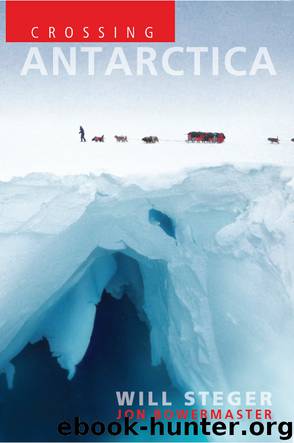Crossing Antarctica by Will Steger

Author:Will Steger
Language: eng
Format: epub
ISBN: ISBN: 9780897328968
Publisher: Menasha Ridge Press
Published: 2010-09-22T04:00:00+00:00
QUITTING IS NOT AN OPTION NOVEMBER
NOVEMBER 1, DAY 98
For the past two days we’ve been paralleling the tallest mountains in Antarctica; thirteen- to fourteen-thousand-foot brutes with walls of rock and ice scaling their surface. Today we had a splendid view of a handful of the Ellsworths’ most majestic peaks—Vinson, Tyree, Anderson, Hubley, and Dawson. We were fortunate to snare the view when we did, because as we traveled on we descended into a thick bank of fog and dropped more than a thousand feet during the day cloaked in a wet blanket of haze.
As we descended, a thick layer of hoarfrost covered the ground, making travel slow and treacherous. Our sleds were braked the length of the eight-mile descent. Just before lunch Victor, on point as usual, made a very steep descent without signaling to Keizo, who was right behind him, of what was to come. As a result, Keizo and his sled raced down the five-hundred-foot slope and both flipped at the bottom. Bags were scattered, dogs were howling, Keizo was angry, and the previously split runner on his sled was broken again. Thankfully, due to experience we’ve gotten adept at such repairs, and we lashed the runner back into working order and were off in less than an hour.
We made camp after twenty-one miles and, since we have just three days’ worth of white gas left, made a quick dinner and crawled into our sleeping bags to preserve our dwindling supply. It had been a mistake to leave two thirds of our gas cache, ten gallons, behind at Fisher. We thought at the time that the film crew was going to drop in on us before we arrived at Patriot Hills, bringing more. But they are still stuck in Punta Arenas awaiting Adventure Network’s repair of their troubled DC-6; as a result we are low on gas, without promise of more until we reach Patriot Hills.
In conditions like these gas is as critical as food, integral to our heat and water supply. Each night we cut eight-inch-square blocks of snow to boil for our evening meal, breakfast and the next day’s thermoses. We bring a nylon bag filled with two-dozen snow blocks into the tent before zipping up for the night and then wedge them one at a time into the nine-inch opening of the ever-present aluminum teapot that dominates the center of our tent. Every day we spend four hours melting snow and ice, which makes me long for the faucets we so take for granted back home. As well as time, though, this process demands fuel. One quart of white gas is needed to produce three gallons of water; on average we make at least two gallons a night and another one and a half gallons in the morning. The temperature inside our tents ranges from 0° to 40°, from the tent floor to its ceiling, but the melting procedure robs heat, with its focus on melting not heating. Every night we look forward to the melting process’s ending so that the stove can devote full attention to warming us.
Download
This site does not store any files on its server. We only index and link to content provided by other sites. Please contact the content providers to delete copyright contents if any and email us, we'll remove relevant links or contents immediately.
A Wilder Time by William E. Glassley(2363)
Erebus by Michael Palin(1522)
Arctic Dreams by Barry Lopez(1415)
Winter Calling by Lynn Galli(1397)
The Art of Fear by Kristen Ulmer(1300)
South with the Sun by Lynne Cox(1222)
Mawson's Will by Lennard Bickel(1146)
Big Dead Place: Inside the Strange and Menacing World of Antarctica (Large Print 16pt) by Nicholas Johnson(1114)
Caroline Alexander by The Endurance: Shackleton's Legendary Antarctic Expedition(1099)
Total Hockey Training by Sean Skahan(1068)
Bugaboo Dreams by Topher Donahue(1057)
Training Season (E) (MM) by Leta Blake(1054)
Zoo Tails by Oliver Graham Jones(1030)
Panama by Lonely planet(998)
Ice by Unknown(963)
Ice! by Tristan Jones(962)
Backyard Ice Rink by Joe Proulx(907)
Lonely Planet Panama by Lonely Planet(897)
Frozen in Time by John Geiger & John Geiger(889)
